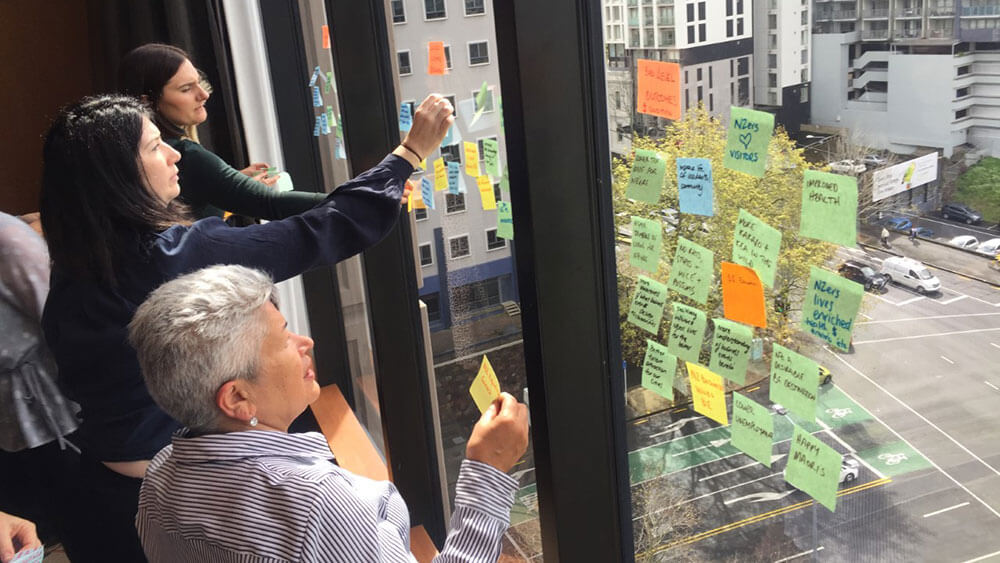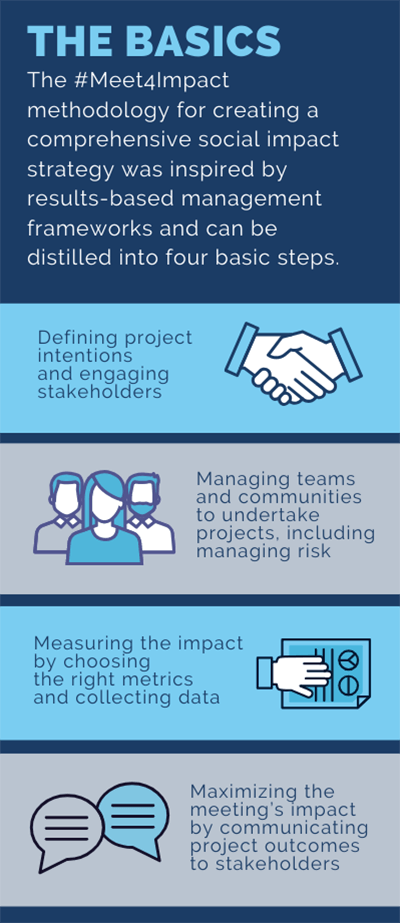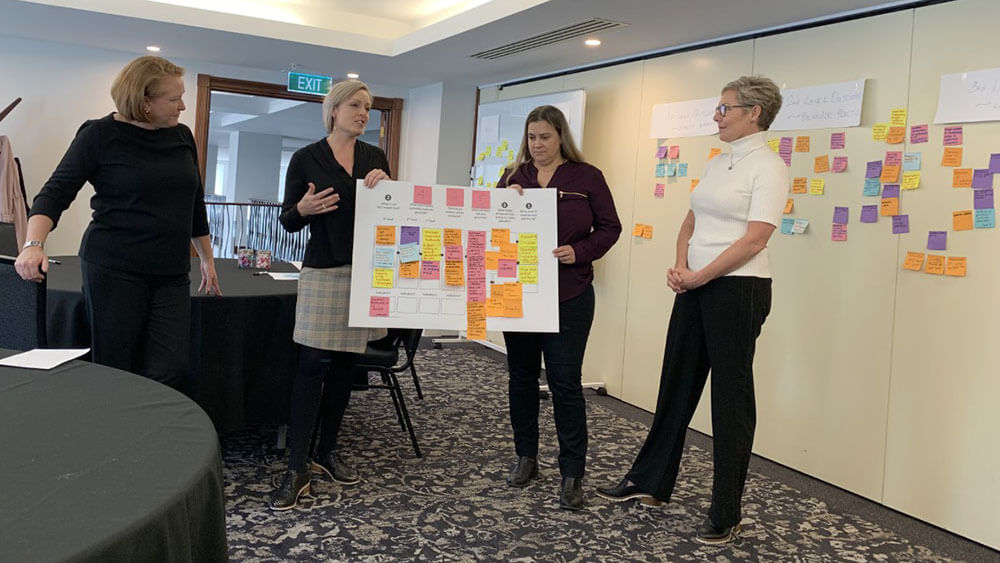
In September 2019, #Meet4Impact ran workshops over 10 days with Tourism New Zealand’s conference organizers and local stakeholders to identify measurable social impact projects.
Geneviève Leclerc, CMP, spent more than 20 years working as a meeting planner for organizations like the consulting company JPdL and The Transplantation Society. But in 2017, after founding her own consulting company, Caravelle Strategies, to work with associations, congresses, and destinations, the Montreal-based Leclerc discovered a whole new world.
As a new consultant, she was in learning mode, and “became very interested and involved in the whole innovation scene in my own city. I started going to a lot of workshops and was working in a coworking space where I was surrounded by startups,” she said, noting that Montreal even has it own virtual incubator for tourism and events, called MT Lab.
Leclerc became absorbed in learning about startups at the same time, she said, that the meetings and events industry was looking for ways to create lasting value and impact in destinations, aside from economic benefits. On one hand, Leclerc said, she was talking to clients and hearing from industry sources about the efforts that meetings were making to add social legacies into their agendas, as well as ways in which destinations were trying to bring social impact into the stories they tell in their efforts to attract business events. “And on the other side, I was being immersed in the social innovation scene and learning about the tools they were developing. And I realized that there was very much a convergence between the two.”
At the same time, Leclerc discovered that there was a need to introduce the tools and methods used by social innovation startups to the meetings industry. Although meetings often generated legacies as part of their mission, she was finding that they usually were not part of a systematic process and their impact was rarely measured. As a result, she said, “the impact created was not well understood and could not be easily reproduced.
 “People were hungry,” she said, for the tools and frameworks that would help them create projects that could be measured in terms of their impact and so they could replicate them in the future, as well as effectively communicate their impact. To fill the gap, along with friend Jacques Blanchet, an expert in social impact and social responsibility, Leclerc launched the nonprofit #Meet4Impact in Montreal in February 2019.
“People were hungry,” she said, for the tools and frameworks that would help them create projects that could be measured in terms of their impact and so they could replicate them in the future, as well as effectively communicate their impact. To fill the gap, along with friend Jacques Blanchet, an expert in social impact and social responsibility, Leclerc launched the nonprofit #Meet4Impact in Montreal in February 2019.
Part of #Meet4Impact’s mission is to educate associations about the difference between legacies and impact. “Legacy is basically what you create and what you leave behind,” Leclerc said, whether it is programs, knowledge, or some other benefit. And according to Leclerc, “the impact is the change that it creates among people [who] are benefiting from legacies.” The business industry has most often understood the definition of impact to be economic, she said, but “impact is also positive change.”
Putting It to the Test
#Meet4Impact additionally works with partners, including destinations and associations, to create pilot projects that develop end-to-end processes that capture the legacy and social impact cycle. Some focus on individual events, but #Meet4Impact is working with Tourism New Zealand, on an ambitious project called “Enrich New Zealand — Conference Impact,” that will apply the #Meet4Impact’s tools and methodology to measuring the social impact of three conferences over the next two years: The 2020 INTECOL International Wetlands Conference in Christchurch in October, which is raising awareness of the responsible use of natural resources; the 2022 World Leisure Congress in Dunedin, focused on leisure and access to leisure from multiple points of view; and the 2022 International Working Group on Women and Sport in Auckland, which seeks to advance and empower women in sports.
With the help of #Meet4Impact, Tourism New Zealand created roadmaps for each project, identifying their legacy objectives and creating a specific reporting strategy around their impact. “It’s not just saying, ‘We want to increase access to female professional athletes,’” Leclerc said.
“It’s not just about making a wish and saying, ‘We’re going to have this conference and we want to do this.’ It’s actually saying, ‘These [goals] are what we want to achieve in this much time. These are our targets, this is what we’re going to do for it, and this is how we’re going to report it — and then hold ourselves accountable.’”
According to Leclerc, Tourism New Zealand sought conferences where they could maximize their own learning, while also engaging association clients in the process. “It really is a very large collaboration project between ourselves, Tourism New Zealand as the project leader, and then involving three convention bureaus in three different cities,” Leclerc said.
“And in each of these three cities, it is involving a host of local associations and international associations.” Tourism New Zealand’s ultimate aim is to be able to continue to apply the methods learned to future conferences for years to come.
The organization will work with Tourism New Zealand throughout these three events and beyond to measure conference outcomes — something Leclerc said is simplified due to New Zealand’s progressive ethos as a country.
“They have a very favorable political context to making sure that any event that comes into the country must have a positive effect on the environment and on the well-being of citizens,” she explained. “It’s a complete shift in mindset for the industry that says, ‘We want the move to become a value-creating industry and we want to be perceived as not only generating economic impact, but we want to be perceived as helping social growth, helping environmental protection, and just generally leaving behind more than we take.’”

#Meet4Impact will work with Tourism New Zealand for the next several years on social impact projects all around the country.
A Global Research Agenda
Last fall, #Meet4Impact’s Geneviève Leclerc announced a global #Meet4impact Project, with the goal of creating a framework that will serve as a comprehensive process for generating, managing, and measuring the positive social impacts of association conferences and create a knowledge bank of best practices. #Meet4Impact is partnering in a study with the Palais des congrès de Montréal, the School of Management Sciences in Montreal, and another Canadian nonprofit, Mitacs.
Other research projects include a study that will look at the contribution of business events to the United Nations’ Sustainable Development Goals (SDGs) and the effective way to place accountability at the heart of business events and assess the impact of the goals.
RELATED: A To-Do List for Planet Earth’s Planners
In its own work with clients, #Meet4Impact aligns with the UN’s SDGs, and four in particular: SDG 4, quality education; SDG 9, industry, innovation, and infrastructure; SDG 11, sustainable cities and communities; and SDG 17, partnerships for the goals.
“Sometimes it’s a little bit theoretical when we talk about social impact,” Leclerc said. “We use the SDGs to help [organizations] identify what they’re already working on and what their sphere of action is, and then use the SDGs as a global framework to anchor their efforts into global efforts.”
Casey Gale is an associate editor at Convene.
